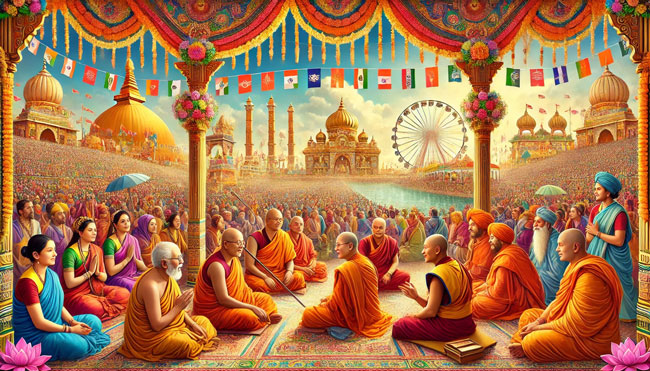 The Kumbh Mela, one of India’s largest and most significant religious gatherings, is held every 12 years at four sacred locations—Prayagraj, Haridwar, Ujjain, and Nashik. While it is primarily a Hindu religious festival, its universality and sanctity have influenced other religions, including Buddhism.
The Kumbh Mela, one of India’s largest and most significant religious gatherings, is held every 12 years at four sacred locations—Prayagraj, Haridwar, Ujjain, and Nashik. While it is primarily a Hindu religious festival, its universality and sanctity have influenced other religions, including Buddhism.
Connection Between Buddhism and the Kumbh Mela
Buddhism places great importance on pilgrimages and sacred sites. Although the Kumbh Mela is deeply rooted in Hindu rituals, its history and mythology share subtle yet profound connections with Buddhism.
- The Tale of Samudra Manthan (Churning of the Ocean)
The Kumbh Mela originates from the legend of the Samudra Manthan, where gods (Devas) and demons (Asuras) churned the ocean to obtain the elixir of immortality (Amrit). While this tale is primarily Hindu, Buddhist traditions have interpreted similar allegories emphasizing moral and spiritual lessons. - Mahayana Buddhism and Pilgrimage
The Mahayana branch of Buddhism emphasizes the importance of pilgrimage to sacred sites. The spiritual significance of the Kumbh Mela locations has drawn Buddhist practitioners over the centuries, where they have engaged in dialogue and exchange of ideas with Hindu sages.
Historical Context
- Emperor Ashoka’s Influence
Emperor Ashoka, after embracing Buddhism, played a significant role in promoting the religion and developing centers of learning in places like Prayagraj, Haridwar, and Ujjain. These cities, also central to the Kumbh Mela, became hubs of cultural and spiritual convergence. - A Meeting of Cultures
The Kumbh Mela has historically been a platform for cultural and philosophical dialogue, bringing together Hindu and Buddhist traditions to foster mutual understanding.
Philosophical Alignment
Buddhism emphasizes non-violence, meditation, and inner purification. The Kumbh Mela’s ritualistic bathing, aimed at spiritual cleansing and attaining liberation (Moksha), resonates with Buddhist teachings of mindfulness and inner peace.
The Modern Era
In contemporary times, the Kumbh Mela sees participation from followers of Buddhism, symbolizing its role as a universal festival transcending religious boundaries. The event serves as a reminder of unity and shared human values.
The Kumbh Mela is not just a religious event but a symbol of cultural and spiritual amalgamation. Buddhism, with its moral and spiritual ethos, adds a unique perspective to the celebration. Together, the sanctity of the Kumbh Mela and the peace promoted by Buddhism inspire a vision of global harmony and coexistence.




